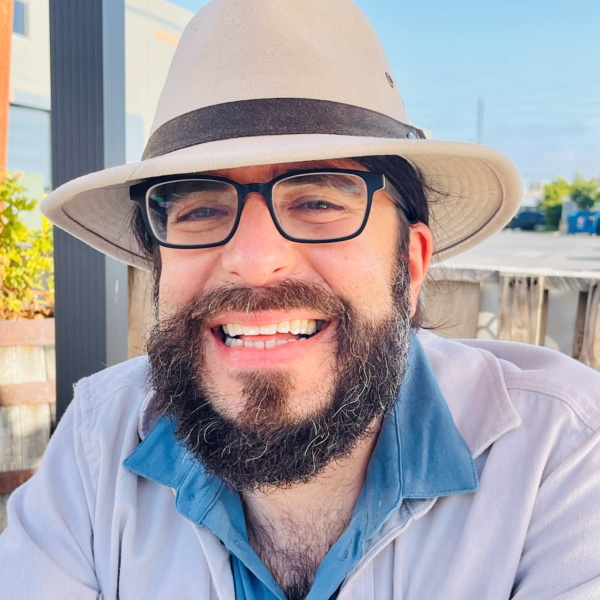Advertisement
A musician is redefining the sound of a Greek instrument

Legendary clarinetist Petroloukas Halkias and millennial laouto player Vasilis Kostas both hail from the same region of Greece — Epirus — and Halkias even played at Kostas’ parents’ wedding. But the two never met until Kostas moved to Boston. In 2015, Halkias was playing an event for the Epirotic Society of Worcester. Kostas came and played Halkias one of his own compositions, whose title translates to “Shepherd’s Song.”
“I couldn’t believe that a laouto player would want to play such a demanding instrumental composition,” recalls Halkias. In Greek music, the laouto is usually considered an accompanying instrument for the clarinet or violin. “But after I heard Vasilis play, [I] said there is something special here and I want to help this young musician.”
Their cross-generational collaboration has blossomed, with the pair releasing the second volume of their “Soul of Epirus” album this past October. Diving deep into the lamenting and celebratory melodies and rhythms heard at village summer festivals, weddings and funerals has helped Kostas become a musical maverick. He’s now taking his eight-string instrument to new places that have earned him a Grammy nomination and made headlines in Greece.
When Kostas came to Boston to get his master’s at Berklee’s Global Jazz Institute, he was a jazz guitarist. But when a group of students were asked to present some traditional Greek music in Spain, Kostas decided to bring a laouto, which he’d recently begun to learn, and practiced feverishly for weeks before the trip. Flamenco singer José Mercé watched the performance and told Kostas that his future was in this new-to-him instrument. “Because Berklee is so open-minded, the professors encouraged me to play the laouto,” Kostas says. “They didn’t reject me because I was playing an instrument you see only in Greece.”
Even before they met in person, Kostas was working on playing Halkias’ complex clarinet lines on the laouto. The clarinetist “pushes the boundaries of this music while composing new pieces, and he tries to enrich the old pieces with a music vocabulary that is at a very high level but still maintains the sound and identity of the tradition,” explains Kostas. “He has created his own language which is both complicated and beautiful at the same time. That’s why when jazz players at Berklee hear what we’ve recorded together, they call it the bebop of Greece.”
One of those players was BGJI founder and artistic director Danilo Pérez. A native of Panama and longtime Boston resident, Pérez has long been one of jazz’s most heralded pianists, both with his own groups and as part of Wayne Shorter’s final quartet. One night, he invited Kostas and his frequent collaborator, Iraqi/Jordanian violinist Layth Sidiq, to dinner at his home and made a bold announcement: He was starting a new band, the Global Jazz Messengers, and wanted them to be a part of it.
“My legs were shaking, because I’d seen him with Wayne Shorter, but he heard something in his head and thought we could do something together,” recalls Kostas.
The sextet, which also includes American and Palestinian musicians, seeks to establish a new borderless global community through jazz. "Crisálida," the Global Jazz Messengers’ 2022 debut, earned a Grammy nomination.
Diving into such deep improvisatory waters meant that at some point, Kostas says he “stopped thinking about being a laouto player. I was focused more on what unique idea each musician was bringing.”
After being mentored by two different master musicians, Kostas now has his own protégés. Along with percussionist George Lernis, he’s the co-director of the Anatoliama Ensemble and its New England Greek Orchestra, a group that gives students the opportunity to intensively study Greek musical traditions over the course of a year. “It’s a great message for people in Greece to see how here in America people appreciate and learn our music,” says Kostas.
The orchestra will be part of a Soul of Epirus concert on Friday, May 10, at the Maliotis Cultural Center at Hellenic College Holy Cross in Brookline, a venue that Kostas says plays a central role in presenting Greek culture in New England. The concert lineup also includes vocalist Aimilia Chalkia, clarinetist Nektarios Papageorgiou, violinist Beth Bahia Cohen and the St. Romanos the Melodist Byzantine Choir.
“We arranged a polyphonic piece for the choir, which is a new thing to do,” says Kostas. “We tried to have as many colors as possible from all music of Epirus for this concert.”
Halkias, whose father was also a legendary clarinet player and a National Heritage Fellow, spent 20 years in the United States and still frequently came here to perform until recently. Kostas is now living a similar life. When he’s not playing and teaching in Boston, he’s on the faculty of the University of Macedonia. In November, he’ll go into the studio to record his debut album of original compositions, a project he’s naming “Lena” in memory of his mother.
And he’s still finding time to collaborate with Halkias. “It’s amazing how music has brought us together,” he says. “I’m 34, and he’s 90 this July, and we keep exploring together.”
“We’re a family now, and I see that future generations will share this musical knowledge and preserve these traditions for decades to come,” says Halkias from Athens. “It makes me very optimistic.”
“The Soul of Epirus” concert will be performed on Friday, May 10, at 7 p.m. at Maliotis Cultural Center at Hellenic College Holy Cross in Brookline.



